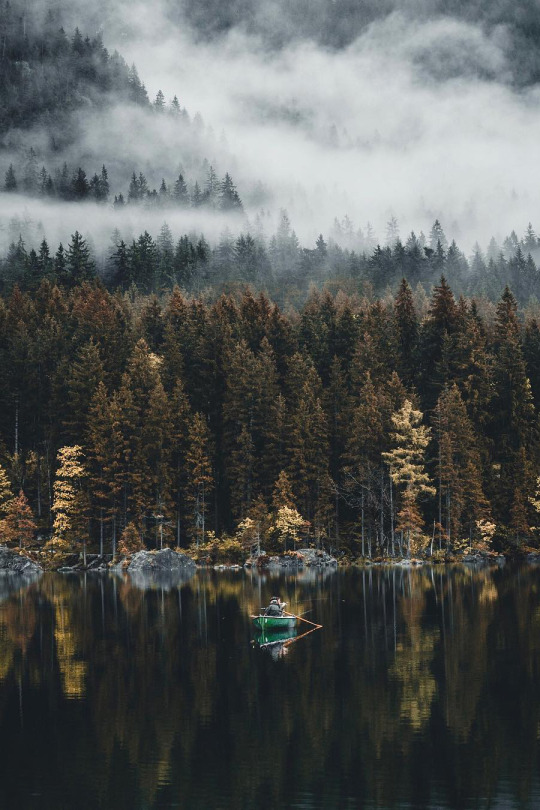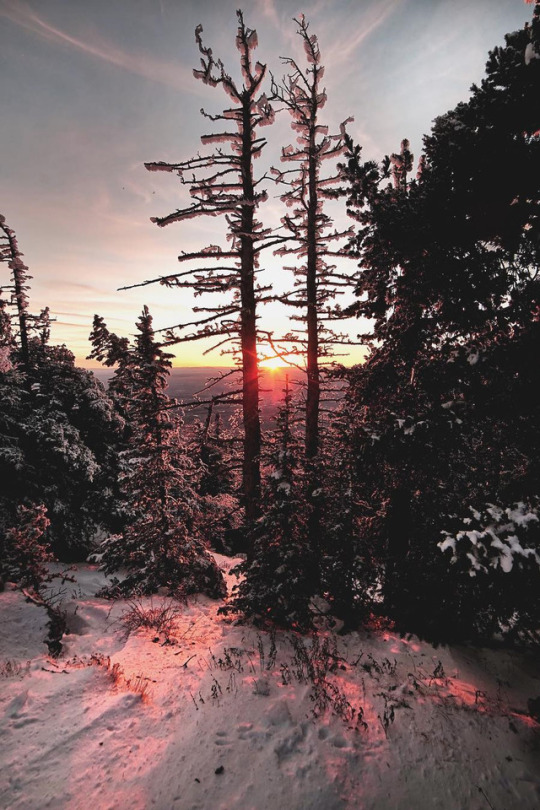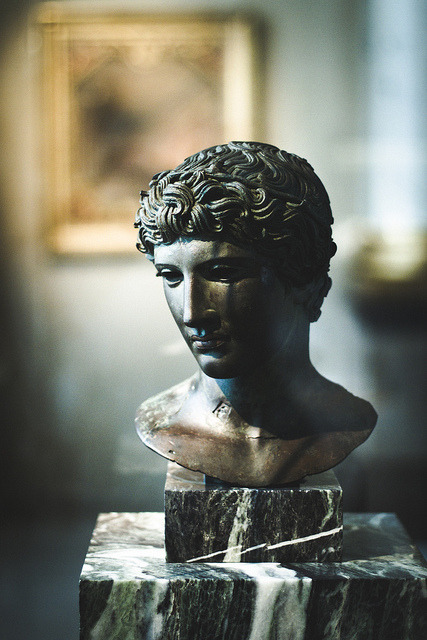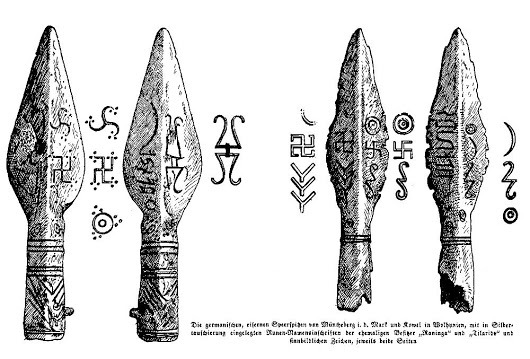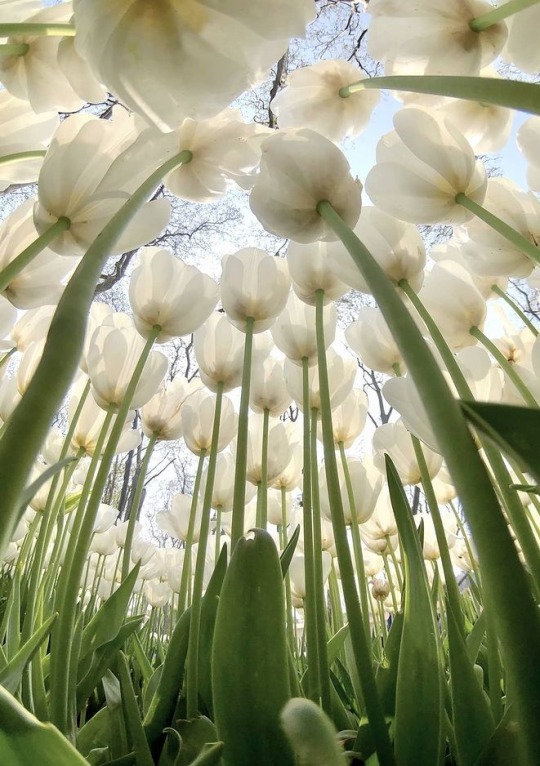Text
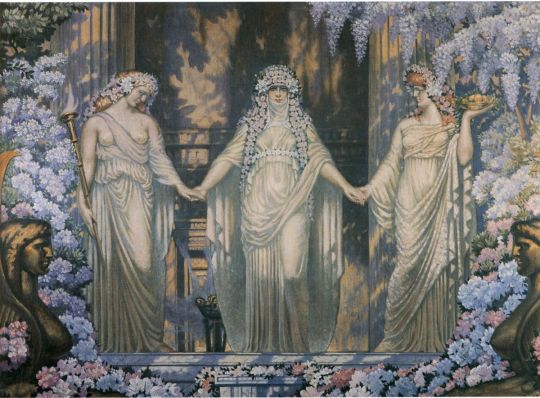
The Women of Eleusis by Jean Delville 1931
"The Eleusinians have a temple of Triptolemos, of Artemis of the Portal, and of Poseidon Father, and a well called Kallikhoron (beautiful place for dance and song), where first the women of the Eleusinians danced and sang in praise of the Goddess. They say that the plain called Rharium was the first to be sown and the first to grow crops, and for this reason it is the custom to use sacrificial barley and to make cakes for the sacrifices from its produce. Here there is shown a threshing-floor called that of Triptolemos and an altar.
My dream forbade the description of the things within the wall of the sanctuary, and the uninitiated are of course not permitted to learn that which they are prevented from seeing."
-Pausanias, Description of Greece: 1.38.6
https://paganimagevault.blogspot.com/2019/12/the-women-of-eleusis-by-jean-delville.html
86 notes
·
View notes
Text
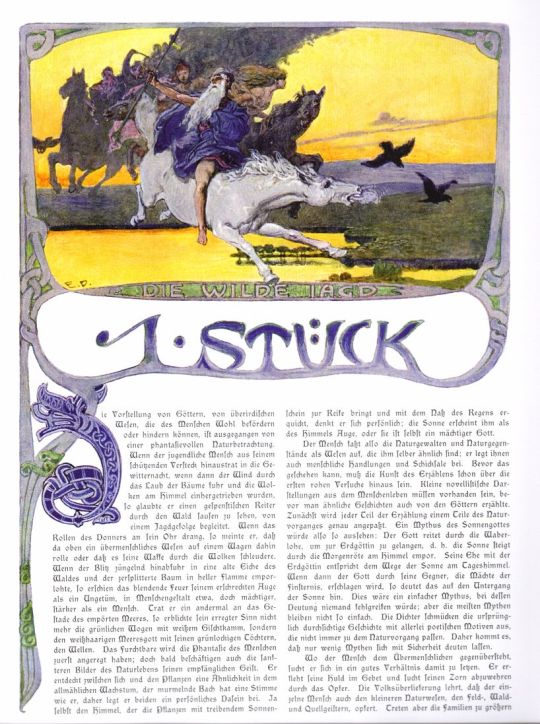
The Wild Hunt by Emil Doepler 1905
"Grimm believed that in pre-Christian Europe, the hunt, led by a God and a Goddess, either visited "the land at some holy tide, bringing welfare and blessing, accepting gifts and offerings of the people" or they alternately float "unseen through the air, perceptible in cloudy shapes, in the roar and howl of the winds, carrying on war, hunting or the game of ninepins, the chief employments of ancient heroes: an array which, less tied down to a definite time, explains more the natural phenomenon." He believed that under the influence of Christianisation, the story was converted from being that of a "solemn march of Gods" to being "a pack of horrid spectres, dashed with dark and devilish ingredients". A little earlier, in 1823, Felicia Hemans records this legend in her poem The Wild Huntsman, linking it here specifically to the castles of Rodenstein and Schnellerts, and to the Odenwald. In the influential book Kultische Geheimbünde der Germanen (1934), Otto Höfler argued that the German motifs of the 'Wild Hunt' should be interpreted as the spectral troops led by the God Wuotan, which had a ritualistic counterpart in the living bands of ecstatic warriors (Old Norse berserkir), allegedly in a cultic union with the dead warriors of the past." -taken from wikipedia
https://paganimagevault.blogspot.com/2019/12/the-wild-hunt-by-emil-doepler-1900.html
14 notes
·
View notes
Text

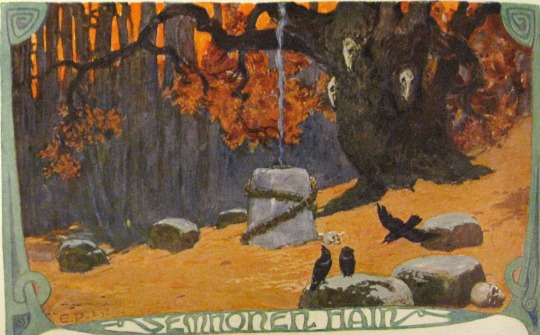
The Semnones' Grove of Fetters by Emil Doepler 1905
"A grove of fetters (Old Norse: Fjöturlundr) is mentioned in the Eddic poem "Helgakviða Hundingsbana II": Helgi obtained Sigrún, and they had sons. Helgi lived not to be old. Dag, the son of Högni, sacrificed to Odin, for vengeance for his father. Odin lent Dag his spear. Dag met with his relation Helgi in a place called Fiöturlund, and pierced him through with his spear. Helgi fell there, but Dag rode to the mountains and told Sigrún what had taken place. ― Helgakviða Hundingsbana II, Thorpe's translation The description is often compared with a section by Tacitus on a sacred grove of the Semnones: At a stated period, all the tribes of the same race assemble by their representatives in a grove consecrated by the auguries of their forefathers, and by immemorial associations of terror. Here, having publicly slaughtered a human victim, they celebrate the horrible beginning of their barbarous rite. Reverence also in other ways is paid to the grove. No one enters it except bound with a chain, as an inferior acknowledging the might of the local divinity. If he chance to fall, it is not lawful for him to be lifted up, or to rise to his feet; he must crawl out along the ground. All this superstition implies the belief that from this spot the nation took its origin, that here dwells the supreme and all-ruling deity, to whom all else is subject and obedient." -taken from wikipedia
https://paganimagevault.blogspot.com/2019/12/the-semnones-grove-of-fetters-by-emil.html
6 notes
·
View notes
Text



Odin and Freyja at the sky window by Emil Doepler 1905
"At this point, the men of old tell a silly story that the Wandals coming to Godan (Wotan) besought him for victory over the Winnili and that he answered that he would give the victory to those whom he saw first at sunrise; that then Gambara went to Frea (Freja) wife of Godan and asked for victory for the Winnili, and that Frea gave her counsel that the women of the Winnili should take down their hair and arrange it upon the face like a beard, and that in the early morning they should be present with their husbands and in like manner station themselves to be seen by Godan from the quarter in which he had been wont to look through his window toward the east. And so it was done. And when Godan saw them at sunrise he said: "Who are these long-beards?" And then Frea induced him to give the victory to those to whom he had given the name."
-Paul the Deacon, History of the Lombards, Chapter 8
https://paganimagevault.blogspot.com/2019/12/odin-and-freyja-at-sky-window-by-emil.html
8 notes
·
View notes
Text

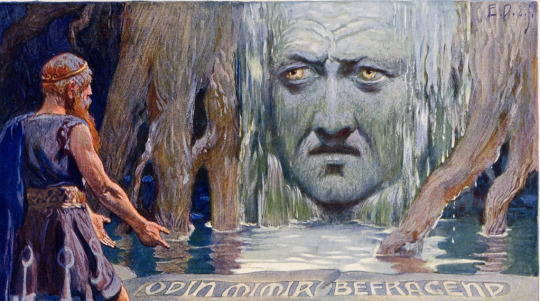
Odin questioning Mimir by Emil Doepler 1905
"...under that root which turns toward the Rime-Giants is Mímir's Well, wherein wisdom and understanding are stored; and he is called Mímir, who keeps the well. He is full of ancient lore, since he drinks of the well from the Gjallar-Horn."
-Gylfaginning, Chapter 15
https://paganimagevault.blogspot.com/2019/12/odin-questioning-mimir-by-emil-doepler.html
30 notes
·
View notes
Text

In Balder's Grove by E. Klein 1899
"Beloved, why quakest thou? Thou hast no cause for fear. Bjorn stands out there with bared sword and warriors enough to guard us, should need be, against a world. I myself would brave a world for thee, to hold thee thus. 'T were joy to be borne away to Valhalla's heights, wert but thou my Valkyrie: to have thee bend over me as I lie on the bloody field, look in my face with thy dear eyes, then lift me on thy wind-winged steed; to soar with thee,--up, up, to Odin's heavenly halls,--what fate more blessed? What whisperest thou in such affright? Is it Balder's wrath thou dreadest? Why, he cannot be wroth with us. He too did love, the gentle God, was faithful unto death. Did he not love sweet Nanna, his wife, even as I love thee?" -Frithjof, the viking of Norway: and Roland, the paladin of France by Zénaïde Alexeïevna Ragozin; Chapter VII, pages 44-45
https://paganimagevault.blogspot.com/2020/05/in-balders-grove-by-e-klein-1899.html
96 notes
·
View notes
Photo

With flaming head and flaming wheel, Sunna find back your way!
321 notes
·
View notes
Photo


absolutely obsessed with this statue of hector and andromache I found out about the other day… the tender Content is SO good
15K notes
·
View notes

